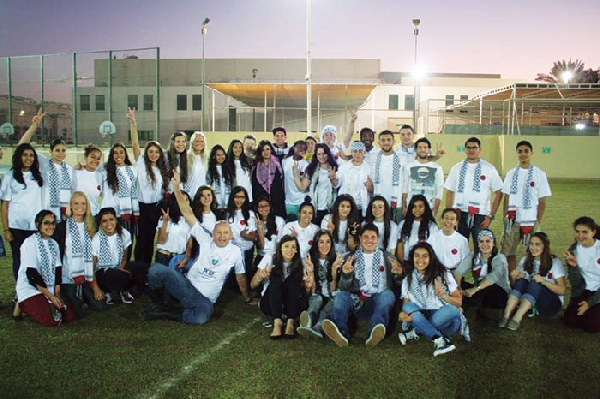 |
| Rachelle (c) at her high school’s PCRF gala. |
DEARBORN — Arab Americans living thousands of miles away from their relatives and culture are instilled with love and reverence for Palestine from a young age, whatever their Arab nationality is.
While visiting relatives back home, many eventually understand what happens in the colonized state nearby from the news that’s often filled with horrifying images of murdered children their age.
The images they see and stories they hear cannot be unglued from their minds when they come back to the States and their ultimate devotion to free Palestine transfers from one generation to another.
Lebanese American Rachelle Ibrahim, a 20-year-old University of Michigan-Dearborn student, dedicated her summers to volunteering at a Palestinian refugee camp in Bourj el Barajneh, a municipality located in the southern suburbs of Beirut.
At the age of 7, she found herself shocked by all the suffering she was seeing on T.V. while watching the news with her paternal grandfather at her family home in Lebanon
“My grandpa would always come over to our house and we would sit together and watch the news,” the business and pre-law student said. “It’d always be showing the situation in Palestine and how the kids were suffering.”
She remembers asking him, “What’s that? Are those fireworks?” as the news footage showed explosions lighting up the sky from a distance.
Without hesitating, her grandpa answered, “They’re bombing them there” and told her the story of Palestine.
“He didn’t hold back, even though I was a kid,” Ibrahim said. “He was very upfront and open about it.”
 |
| ‘Tata’ telling childhood stories. |
From that moment on, her parents nourished her philanthropist mindset until she was ready to act on her own.
“My dad always instilled in us Alhamdillah
(Thank God) you have everything, so you should be able to give back in some way,” Ibrahim said.
At age 15, she decided to start visiting the refugee camp near her home with both her grandfather and her aunt’s friend, whose mother had been residing there since 1948.
Approximately 450,000 registered Palestinian refugees dispersed across 12 refugee camps in Lebanon that year and live under terrible conditions to this day. The crammed camps have no access to clean water and are plagued with high humidity, rainwater damage to ceilings and walls, poor ventilation and loads of garbage.
As Ibrahim walked through the narrow alleyways of the Bourj el Barajneh camp, she felt the electric wires directly touching them— a clear signal of danger. She saw worn-down houses with lots of “free Palestine” graffiti on the walls and an underground school in bad condition.
Ibrahim decided to interview and film a couple of refugees to give them an opportunity to share their concerns.
“The thing they were most concerned about was their kids’ education,” she said. “Lebanon is very restrictive with the degrees they can pursue, so the refugees would say, ‘I just want my kids to go to school and have a better life than me.'”
As a Palestine’s Children Relief Fund officer, she presented the footage at The American Community School of Abu Dhabi, where she studied for a while, raising $10,000 for the camp.
Palestinian lives depend on the United Nations Work and Relief Agency for basic services like healthcare and education. Treatments for chronic diseases are still quite hard to cover, so Palestinians were and still are in much need of financial assistance.
Amal Sleiman, a 35-year-old refugee who lost her husband to cancer, told Ibrahim about her struggle to pay for his treatments and procedures. She said the UNRWA could not fully fund them.
“The first procedure cost $1,250 and the second one cost $2,500,” she said in the footage shot by Ibrahim. “I couldn’t find one person to help me the second time, except local charities. I would run from place to place trying to get $200 dollars from here, $300 from there, in order to pay for his procedure.”
Yet, the procedures didn’t help and Sleiman’s husband had no choice but to undergo chemotherapy every week. After 20 sessions and no results, the doctor informed her about a new medication that he thought could help.
“It cost 5 million LBP ($3,325),” she said. “I went from place to place, asking for financial assistance, but I wasn’t able to cover it.”
After she broke down at the doctor’s office and explained to him the hardships they had endured, the doctor told her there’s another medication for 1 million LBP ($667). She was able to collect enough money to buy it for her husband, but he did not last a month after taking it.
This is only one example of many difficulties in these disadvantaged camps. Still, Ibrahim managed to find a positive light in the darkness— persistence.
“I think the thing that really got to me was something positive,” she said. “It’s really hard to sit there and listen to everything they’re going through, but my favorite part was interviewing the Tata (grandma/old woman). She believes that she will go back home one day. She still has hope and I think that’s something that’s really powerful.”
The Tata, Ibrahim’s tour guide’s mother, was present when the Israelis occupied her country and when her people looked for refuge outside. Through all the struggles, she continues to reminisce about her childhood in Palestine and recite poetry to her visitors.
“In the end, the country is my country and it’ll eventually come back to me,” she told Ibrahim.






Leave a Reply